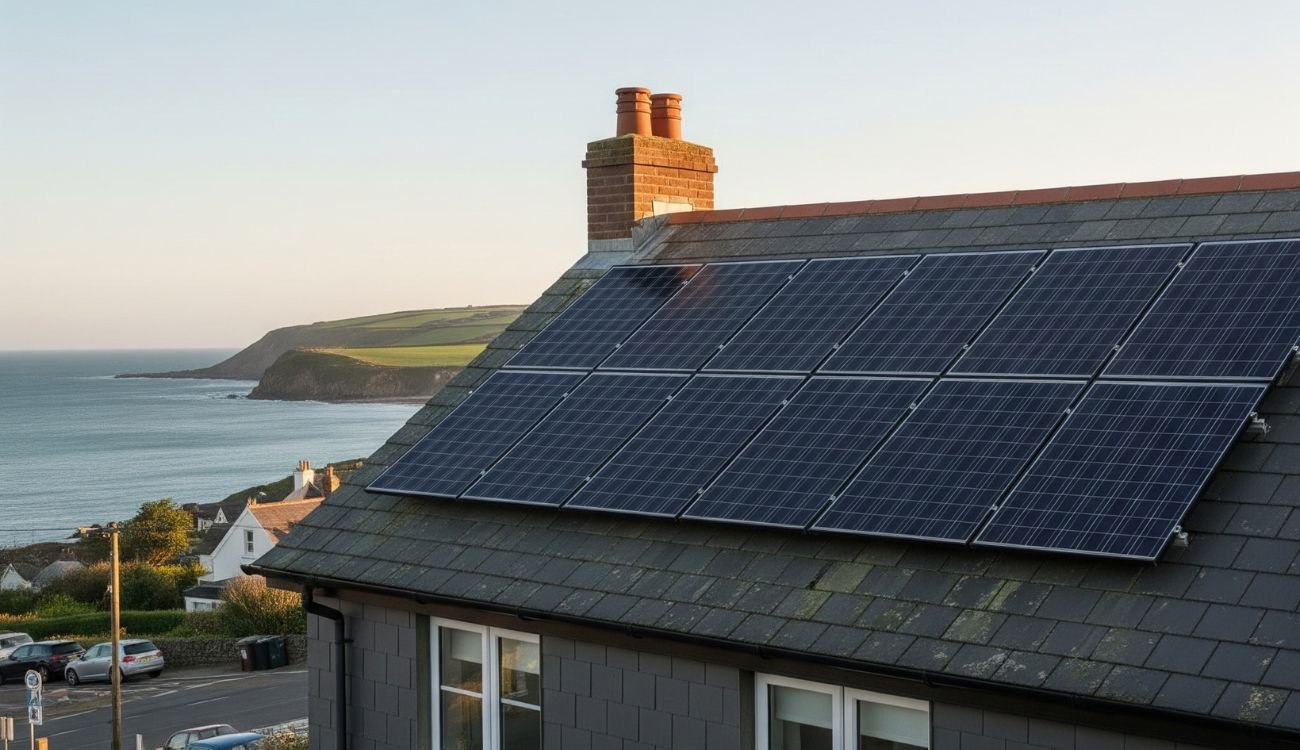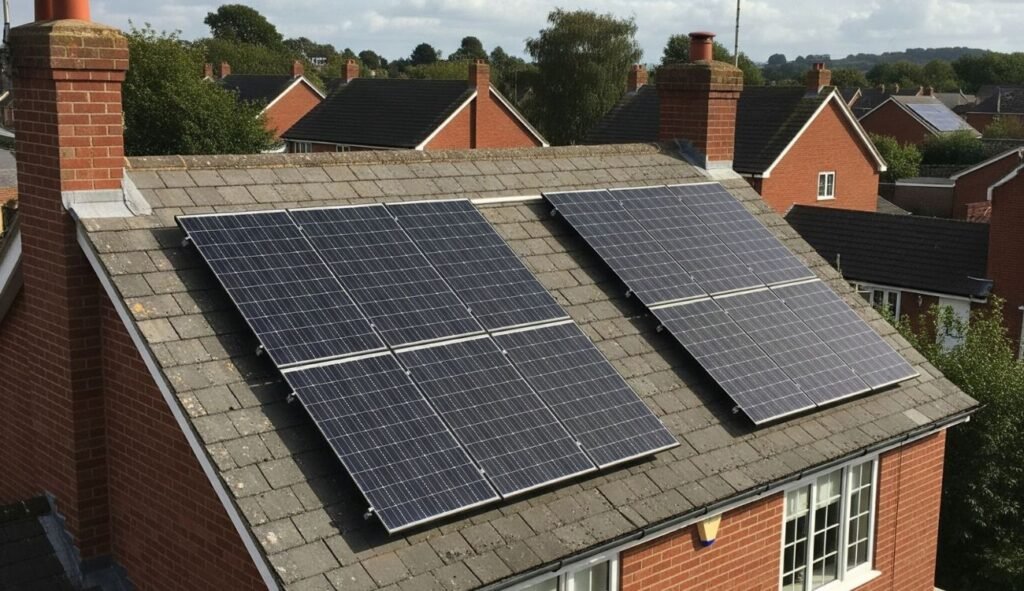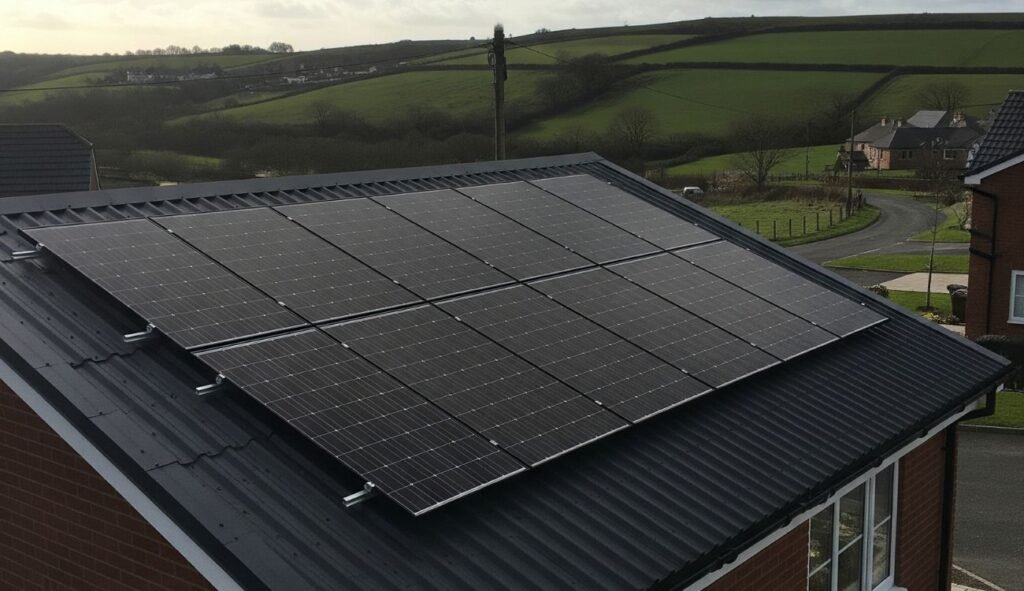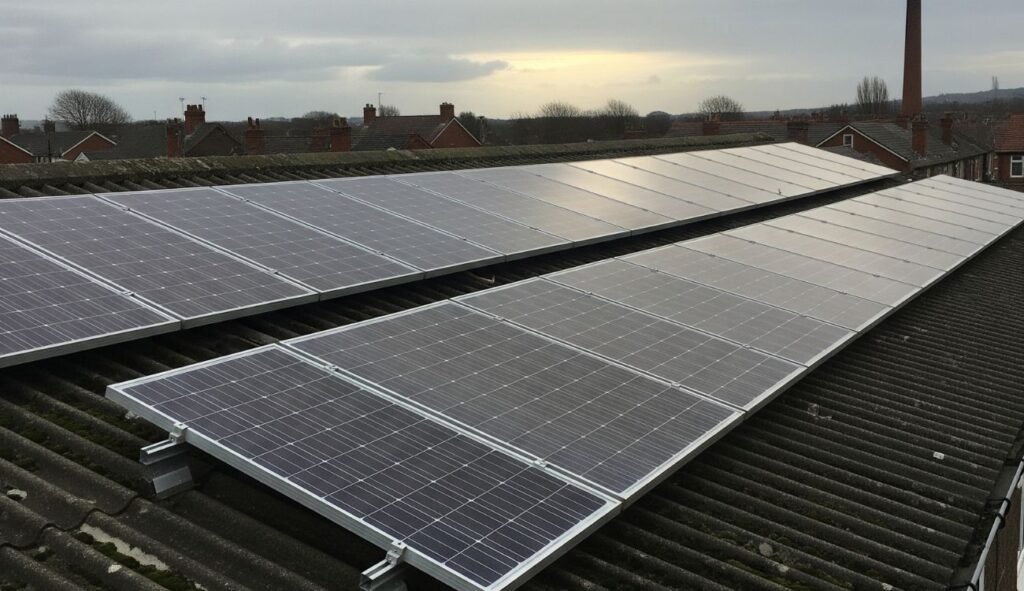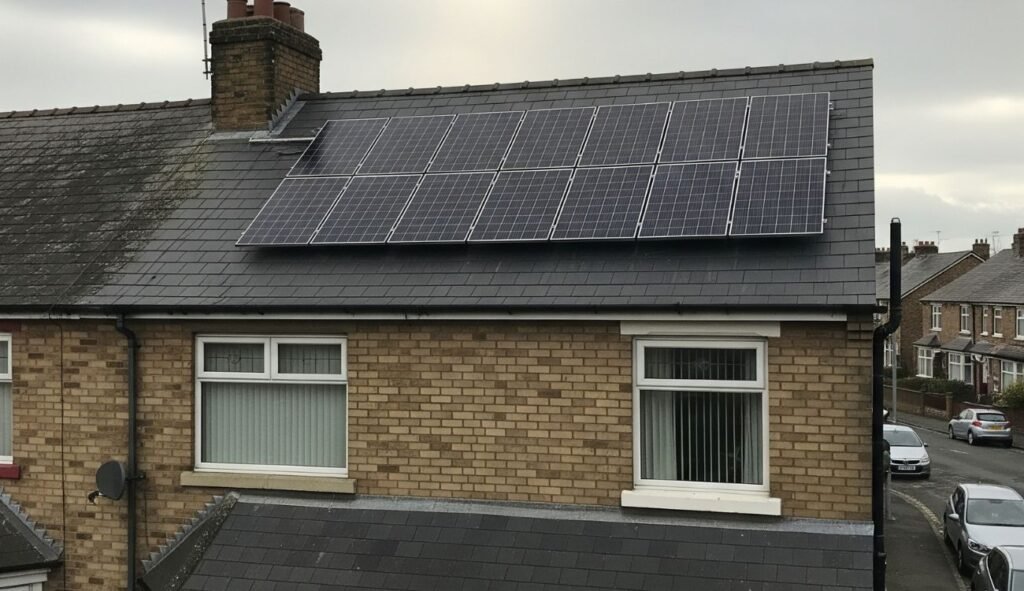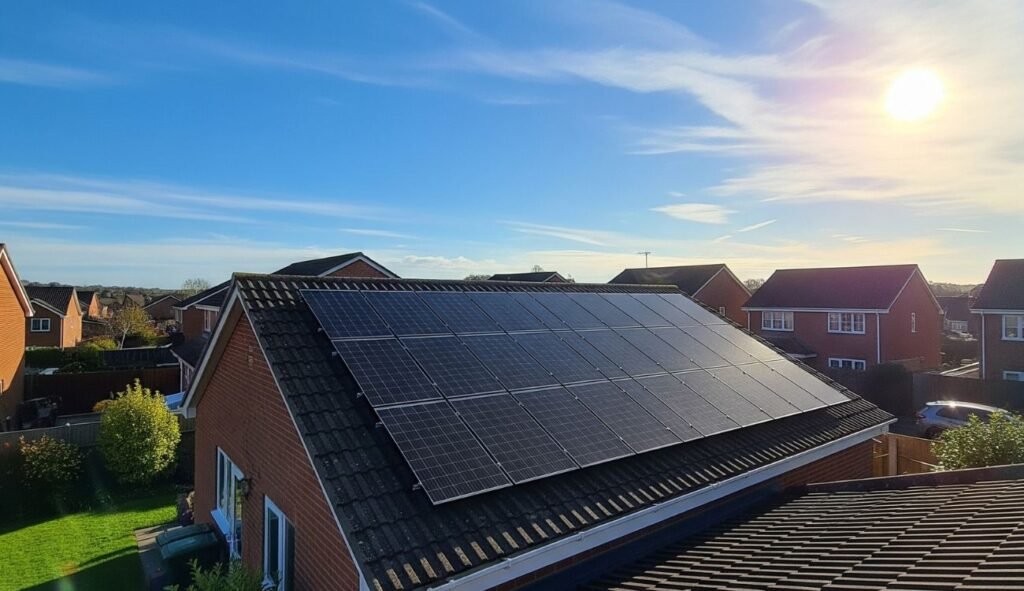Living near the coast in the North East of England offers stunning views and abundant sunlight, making it an ideal location for solar panel installations.
However, a common concern for homeowners and landlords in coastal areas is whether solar panels can withstand salt water corrosion.
This guide discusses how solar panels perform in salty environments, offering practical advice for UK property owners, to make informed decisions about solar investments.
Are Solar Panels Resistant to Salt Water Corrosion?
Solar panels are designed to be robust, but coastal environments pose unique challenges due to salt-laden air and sea spray. According to the Energy Saving Trust, solar panels are built to withstand various weather conditions, including those in coastal regions, provided they meet specific standards.
Most high-quality solar panels undergo rigorous testing to ensure durability against salt mist corrosion, making them suitable for homes and commercial properties near the sea.
Let’s dive into how manufacturers achieve this resilience and what it means for you as a homeowner or landlord in the North East.
What Makes Solar Panels Resistant to Salt Corrosion?
Modern solar panels are engineered with materials and designs that combat the corrosive effects of salt water and sea air. Here’s how:
- Anodised Aluminium Frames: Most solar panel frames are made from anodised aluminium, which forms a protective oxide layer that resists corrosion, even in salty conditions. This material is lightweight yet durable, ideal for coastal installations.
- Vacuum-Sealed Modules: Solar panels are vacuum-sealed between a tempered glass front and a back sheet, preventing moisture and salt from penetrating the internal components, such as the solar cells.
- IEC 61701 Certification: The International Electrotechnical Commission (IEC) 61701 standard tests solar panels for salt mist corrosion resistance. Panels rated at Level 6 (the highest) endure 112 days of simulated salty conditions with less than a 2% power decline, ensuring longevity in coastal areas like the North East.
According to Solar Energy UK, most Tier 1 panels meet this standard, offering peace of mind for coastal installations. - Protective Coatings: Some manufacturers apply anti-corrosive coatings to metal components, enhancing resistance to salt-induced damage.
These features ensure that solar panels can withstand the harsh coastal conditions prevalent in areas like Newcastle or Sunderland.
Why Is Salt Water Corrosion a Concern for Solar Panels?
Salt water and sea air accelerate corrosion in metals, which can affect solar panel systems if not properly addressed. According to a 2023 report by the UK government’s Department for Energy Security and Net Zero, coastal regions experience higher humidity and salt deposition, which can lead to rust on metal components like mounting racks and connectors.
If salt seeps into a panel’s internal components due to a crack or poor sealing, it can degrade solar cells, reducing efficiency. Additionally, salt buildup on the panel surface can block sunlight, lowering energy output by up to 6%, as noted in studies by Solar Energy UK.
| Component | Vulnerability to Salt Corrosion | Mitigation Measures |
|---|---|---|
| Solar Panel Frame | Rust on aluminium or steel | Use anodised aluminium; apply protective coatings |
| Solar Cells | Degradation if exposed | Vacuum-sealed modules; IEC 61701 certification |
| Mounting Racks | Rust on steel components | Use galvanised or stainless steel; regular checks |
| Wiring/Connectors | Corrosion at connection points | IP65-rated junction boxes; sheltered installations |
How Can You Protect Solar Panels from Salt Water Corrosion in the North East?
For homeowners and landlords in coastal areas of the North East, such as South Shields or Whitley Bay, protecting your solar investment is crucial. Here are actionable steps to ensure your solar panels remain efficient and durable:
What Certifications Should You Look for in Coastal Solar Panels?
When choosing solar panels, prioritise those with IEC 61701 certification, particularly Level 6, as recommended by Solar Energy UK. This certification ensures the panels can withstand decades of exposure to salty air.
Additionally, check the manufacturer’s warranty for coverage in coastal environments. Some warranties exclude salt-related damage unless the panels are certified for marine use. According to Ofgem, selecting certified panels reduces the risk of premature degradation, ensuring long-term savings.
How Should You Maintain Solar Panels in Coastal Areas?
Regular maintenance is essential to combat salt buildup and corrosion. The Energy Saving Trust advises the following:
- Clean Panels Regularly: Rinse panels with fresh water every 3–6 months to remove salt deposits, which can reduce efficiency by up to 6%. Use a soft cloth or sponge to avoid scratching the glass.
- Inspect for Corrosion: Check mounting racks, wiring, and connectors for signs of rust or salt buildup at least twice a year. Coastal areas like Tynemouth require quarterly inspections due to higher salt exposure.
- Professional Maintenance: Hire a professional installer like Future Heat to conduct annual inspections, ensuring structural integrity and optimal performance.
Where Should You Install Inverters and Batteries?
Inverters and batteries are more vulnerable to salt corrosion than panels. According to Solar Energy UK, inverters should be installed in sheltered locations, such as a garage or a weatherproof enclosure, to protect them from sea air.
In the North East, where coastal winds can carry salt spray up to 200 metres inland, this is particularly important.
What Are the Benefits of Solar Panels in Coastal Areas of the North East?
Despite the challenges of salt water corrosion, coastal areas like Tyne and Wear offer significant advantages for solar power:
- Abundant Sunlight: Coastal regions often have clear skies and less shading, allowing panels to generate maximum electricity. According to the Met Office, the North East receives an average of 1,400 hours of sunshine annually, ideal for solar energy.
- Energy Savings: A typical 4kW solar system can save households £300–£500 annually on energy bills, as per the Energy Saving Trust.
- Environmental Impact: Solar panels reduce carbon emissions, contributing to the UK’s net-zero goals by 2050, as outlined by the Department for Energy Security and Net Zero.
By choosing high-quality, corrosion-resistant panels and professional installation, homeowners and landlords can harness these benefits while minimising risks.
How Do You Choose the Right Solar Panels for Coastal Properties?
Selecting the right solar panels for your coastal home or commercial property involves careful consideration:
- Check for IEC 61701 Certification: Ensure the panels are rated for salt mist resistance, ideally Level 6.
- Verify Warranty Terms: Confirm that the warranty covers coastal installations, as some manufacturers exclude salt-related damage.
- Opt for Tier 1 Panels: Brands like LG, SunPower, and WINAICO offer panels with proven durability in marine environments, as endorsed by Solar Energy UK.
- Consult Local Experts: Future Heat’s team, based in Tyne and Wear, can assess your property’s specific needs and recommend panels suited to the North East’s coastal climate.
For a free, no-obligation quote tailored to your coastal property, contact Future Heat today and start your journey to sustainable energy.
Frequently Asked Questions (FAQs)
Can salt water corrosion affect solar panel warranties in the UK?
Yes, some manufacturers may limit warranty coverage for salt-related damage unless the panels are IEC 61701 certified. Always review the warranty terms to ensure coastal installations are covered, as advised by Solar Energy UK.
How often should I clean my solar panels in a coastal area like Newcastle?
In coastal areas, cleaning every 3–6 months is recommended to remove salt deposits. The Energy Saving Trust suggests more frequent cleaning during periods of high salt spray, such as after storms.
Are there specific mounting materials better suited for coastal installations?
Yes, galvanised or stainless steel mounting systems are ideal for coastal areas due to their resistance to rust. Future Heat uses corrosion-resistant materials to ensure durability in the North East’s salty environment.
Can salt water corrosion impact solar panel installation costs?
Corrosion-resistant panels and materials may slightly increase upfront costs, but they save money long-term by reducing maintenance and replacement needs. According to Ofgem, investing in quality components enhances system longevity.
How does salt water corrosion affect solar panel lifespan in the North East?
With proper maintenance and certified panels, salt water corrosion has minimal impact, allowing panels to last 25–30 years. Regular inspections by professionals ensure optimal performance.
Our Verdict
Investing in solar panels for your coastal property is a smart decision when you choose corrosion-resistant panels and proper maintenance.
By selecting IEC 61701-certified panels, using durable materials, and following a regular cleaning schedule, you can protect your solar system from salt water corrosion while enjoying significant energy savings and environmental benefits.
Future Heat, a trusted solar installer in the North East, offers expert guidance and tailored installations to ensure your system thrives in the region’s coastal climate.
Jamie Maguire is Managing Director at Future Heat Ltd, the UK-based renewable energy company specialising in heat pumps, solar panels and energy-efficient boiler solutions. He leads the company’s strategic vision to decarbonise homes and businesses across the UK by delivering innovative, sustainable heating and power systems. Jamie is passionate about shaping the future of energy, supporting communities and empowering teams of skilled engineers to deliver lasting value and carbon reductions nationwide.

